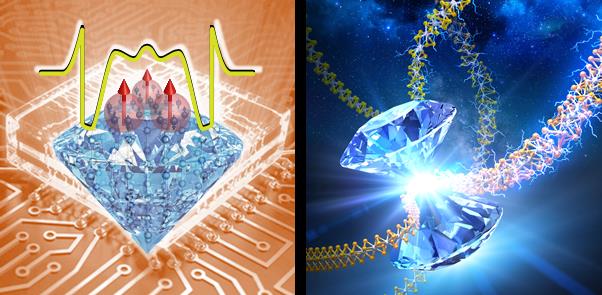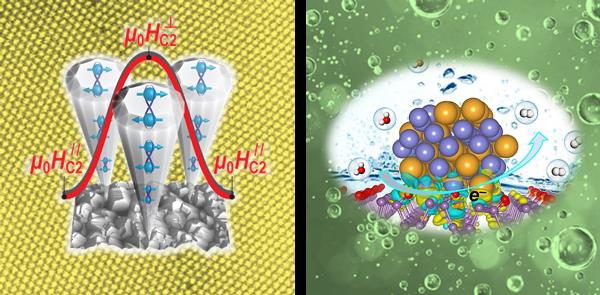Confronted with the desires of further technological developments, traditional devices based on silicon and rooted in classical physics concepts are reaching their upper limits, and new materials and nanotechnology are called to open a new era.
The ongoing revolution is centered on tunable realizations of quantum confinement and coherence effects for the development of brand new electronic, magnetoelectronic, spintronic, and optical systems to realize superior performances of robust miniaturized devices for massive data storage, faster data processing and safer data transfer with low dissipation.
Apart from being a symbol of wealth and prestige, diamond is increasingly being recognized as a piece of jewelry for science and technology, due to a broad spectrum of its properties and wide-ranging applications. The extraordinarily high breakdown voltage and thermal conductivity, remarkable inertness to chemicals and contamination, and tunable electronic properties upon doping make diamond not only a drilling tool for mining and machinery but also a promising candidate for the next-generation electronics and magnetoelectronics. Our research in this field is aimed at unveiling and developing the electronic and magnetoelectronic properties of nanostructured diamond in the quantum regime. We use state-of-the-art nanofabrication techniques to pattern lab-grown diamond thin films into certain nanostructures and devices. The quantum electronic and magnetoelectronic properties are characterized for both potential applications and fundamental research. Meanwhile, our research efforts are also devoted to investigating quantum transport in low-dimensional systems made of other electron-correlated materials.
 |
|
Science Advances Advanced Materials |
 |
|
Physical Review Applied ACS Catalysis |
Selected publications
1. G. Zhang*, T. Samuely, N. Iwahara, J. Kačmarčík, C. Wang, P. W. May, J. K. Jochum, O. Onufriienko, P. Szabó, S. Zhou, P. Samuely, V. V. Moshchalkov, L. Chibotaru, and H.-G. Rubahn, Sci. Adv. 6, eaaz2536 (2020)
2. C. An, Y., Zhou, C. Chen, F. Fei, F. Song, C. Park, J. Zhou, H.-G. Rubahn, V. V. Moshchalkov, X. Chen, G. Zhang*, and Z. Yang, Adv. Mater. 2002352 (2020)
3. G. Zhang*, J. Kačmarčík, Z. Wang, R. Zulkharnay, M. Marcin, X. Ke, S. Chiriaev, V. Adashkevich, P. Szabó, Y. Li, P. Samuely, V. V. Moshchalkov, P. W. May, and H.-G. Rubahn, Phys. Rev. Appl. 12, 064042 (2019)
4. Y. Li, W. Pei, J. He, K. Liu, W. Qi, X. Gao, S. Zhou, H. Xie, K. Yin, Y. Gao, J. He, J. Zhao, J. Hu, T. Chan, Z. Li, G. Zhang, and M. Liu, ACS Catal. 9, 10870 (2019)
5. G. Zhang*, Y. Zhou, S. Korneychuk, T. Samuely, L. Liu, P. W. May, Z. Xu, O. Onufriienko, X. Zhang, J. Verbeeck, P. Samuely, V. V. Moshchalkov, Z. Yang, and H.-G. Rubahn, Phys. Rev. Mater. 3, 034801 (2019)
6. G. Zhang*, T. Samuely, H. Du, Z. Xu, L. Liu, O. Onufriienko, P. W. May, J. Vanacken, P. Szabo, J. Kacmarcik, H. Yuan, P. Samuely, R. E. Dunin-Borkowski, J. Hofkens, and V. V. Moshchalkov, ACS Nano 11, 11746 (2017).
7. G. Zhang*, T. Samuely, Z. Xu, J. K. Jochum, A. Volodin, S. Zhou, P. W. May, O. Onufriienko, J. Kacmarcik, J. A. Steele, J. Li, J. Vanacken, J. Vacik, P. Szabo, H. Yuan, M. B. J. Roeffaers, D. Cerbu, P. Samuely, J. Hofkens, and V. V. Moshchalkov, ACS Nano 11, 5358 (2017).
8. G. Zhang*, T. Samuely, J. Kacmarcik, E. A. Ekimov, J. Li, J. Vanacken, P. Szabo, J. Huang, P. J. Pereira, D. Cerbu, and V. V. Moshchalkov, Phys. Rev. Appl. 6, 064011 (2016).
9. X. D. A. Baumans, D. Cerbu, O.-A. Adami, V. S. Zharinov, N. Verellen, G. Papari, J. E. Scheerder, G. Zhang, V. V. Moshchalkov, A. V. Silhanek, and J. Van de Vondel, Nat. Commun. 7, 10560 (2016).
10. J. Li, M. Ji, T. Schwarz, X. Ke, G. Van Tendeloo, J. Yuan, P. J. Pereira, Y. Huang, G. Zhang, H.-L. Feng, Y.-H. Yuan, T. Hatano, R. Kleiner, D. Koelle, L. F. Chibotaru, K. Yamaura, H.-B. Wang, P.-H. Wu, E. Takayama-Muromachi, J. Vanacken, and V. V. Moshchalkov, Nat. Commun. 6, 7614 (2015).
11. G. Zhang*, S. Turner, E. A. Ekimov, J. Vanacken, M. Timmermans, T. Samuely, V. A. Sidorov, S. M. Stishov, Y. Lu, B. Deloof, B. Goderis, G. Van Tendeloo, J. Van de Vondel, and V. V. Moshchalkov, Adv. Mater. 26, 2034 (2014).
12. G. Zhang*, M. Zeleznik, J. Vanacken, P. W. May, and V. V. Moshchalkov, Phys. Rev. Lett. 110, 077001 (2013).
13. G. Zhang*, S. D. Janssens, J. Vanacken, M. Timmermans, J. Vacik, G. W. Ataklti, W. Decelle, W. Gillijns, B. Goderis, K. Haenen, P. Wagner, and V. V. Moshchalkov, Phys. Rev. B 84, 214517 (2011).
14. G. Zhang*, J. Vanacken, J. Van de Vondel, W. Decelle, J. Fritzsche, V. V. Moshchalkov, B. L. Willems, S. D. Janssens, K. Haenen, and P. Wagner, J. Appl. Phys. 108, 013904 (2010).